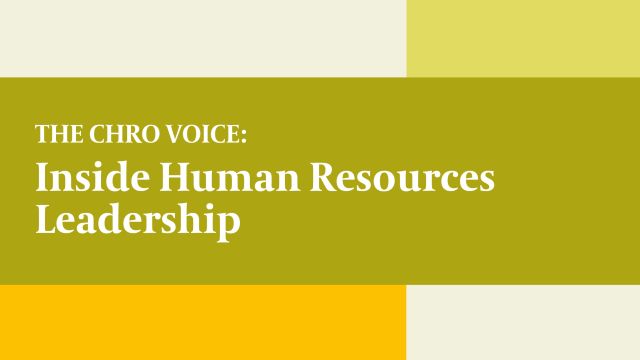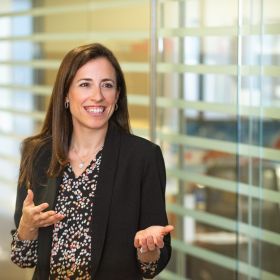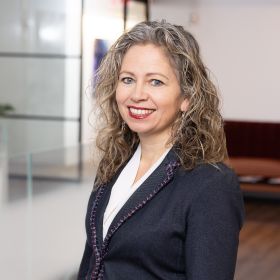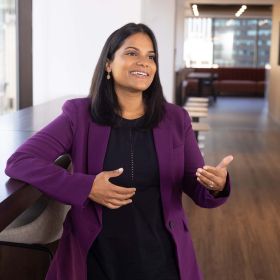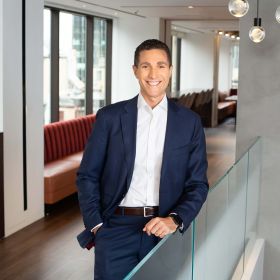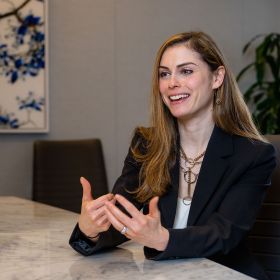While a lot of people are nervous about having such candid conversations [on succession], we see that as a key part of our jobs at Marriott—telling people the truth and helping them be the best version of themselves. And the response was just that from our associates.
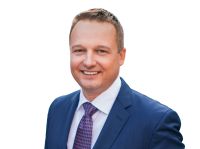 Ty BrelandInternational EVP and CHRO of Marriott
Ty BrelandInternational EVP and CHRO of Marriott
Much has changed in the hospitality industry post-pandemic, but one thing that has remained steadfast at Marriott is a people-first culture. The company is consistently ranked as one of the best places to work—no small feat when you have over 800,000 people who wear the Marriott name badge.
We sat down with Ty Breland, EVP and Chief Human Resources Officer of Marriott International, to find out how he and the executive team keep that people-centric culture thriving, how they’re using Generative AI, and their strategy for investing in their talent.
What are your biggest talent management priorities, and how are you addressing them?
Everything we do starts with our people. Anyone can build amazing hotels—it just takes capital. But to bring those hotels, and our industry, to life, it's always about people. So, we constantly keep a pulse on what our associates need to be successful.
Two things that continue to be headlines among our people are flexibility and choice. In an office setting, we can call this hybrid work. But 90% of the roles at Marriott are hotel-based and performed on-site.
We pressed ourselves and our leadership to discuss how we can engender flexibility on properties, which led us to bring forward more flexible scheduling. I never want one of our associates to miss a doctor's appointment with one of their children or something else pressing because of their schedule. So, we started allowing our associates to pick their schedules, and they can swap with another associate, so if they do have something that comes up last minute instead of being a no-show, they can pass that shift to a peer and pick up another shift.
We also have what we call integrated jobs, which give more choices to associates. With new roles like a guest experience expert, which covers a range of duties (front desk, concierge, etc.), associates can learn and grow in their roles, as well as be more flexible in how they work. This flexibility in their schedules and integration of their jobs has allowed for a richer associate experience, which we're seeing translate into improvements in our customer scores and associate engagement metrics.
The second piece is leadership. With the pace of changes occurring in the world, you have to constantly be investing in individuals as leaders. We've talked about it very simply at Marriott: First, leadership is at all levels, and it is not a title or a pay grade. We want every associate to wake up every day, feeling that they can be the leader they want to be. We want them to be curious—constantly looking around the corner, asking how we could do this differently, what are the things that we're doing well, what are we not doing well and how do we solve that.
With the pace of changes occurring in the world, you have to constantly be investing in individuals as leaders. We've talked about it very simply at Marriott: First, leadership is at all levels, and it is not a title or a pay grade. We want every associate to wake up every day, feeling that they can be the leader they want to be.
Ty BrelandInternational EVP and CHRO of Marriott
But they also need to be courageous. You can be curious all day long, but if you don't act on it, that's a problem. Raise your hand, tell us what's working, and lean into helping solve a problem.
Finally, be connected. No one does anything alone, and so by working with one another, these small things become big things for the company, and we move the business forward.
How have you engaged with the board and the C-Suite beyond traditional HR responsibilities, and how do you demonstrate the business value HR brings to the table?
I came into this role in 2021, right in the midst of the pandemic. My very first week as CHRO coincided with our board meeting. From the start, I had to partner with my peers and the board to stabilize the organization and lay out our recovery strategy for the next several years. Our board is very active, which made it easier to build a great partnership. We quickly realized we needed a strategy to pull Marriott forward after losing over 90% of our revenue due to the pandemic. This led to our "Growing Forward" strategy, where our people strategy is the foundation.
As we looked at recalibrating where we wanted to go as a business, we identified what we call our “Signature Elements.” The first element is growing great leaders. We felt that if we got leadership right, everything else would fall into place. The second element was investing in our associates, purposefully using the word “investment” and not just the cost of wages. We believed that if we invested in our associates, they were going to help set the company up for greater success in the future. The third element is providing access to opportunity. One of the things we are most proud of at Marriott is our ability to promote from within where we can and accelerate individuals’ careers. This is something we’ve continued to build on following the pandemic.
How are you leveraging AI in your HR strategy, and what's next for you in that space?
We were very thoughtful as we started to set up our AI strategy, and I'm one of the co-sponsors of that strategy, along with our head of Global Technology as well as our Chief Customer Officer, which enables us to take a more holistic approach. An early example of this is when we recognized the potential advantages of Generative AI was within our customer engagement centers. These centers handle all incoming calls, including changes to reservations and questions about points. We identified areas where Generative AI could significantly enhance business efficiencies using data analysis. But instead of just going in with a classic top-down deployment model, we asked the agents what their biggest pain points were and what they would change.
Sure enough, their feedback lined up exactly with what our data said, but by asking them the question and letting them voice where they felt the opportunity was when we deployed the solution; it was aligned with what they asked for and resulted in a successful implementation. I don't know that we would have gotten to that same deployment model if we hadn't had multiple co-sponsors.
In each iteration and application of AI, we try to take that approach where our associates are leaning into the technology, taking advantage of it and seeing it as an extension of who they are and how they pull through our customer service elements. Not this replacement of them or replacement of their work; it's an augmentation.
More recently, we’ve been leaning into communications to make it easy for associates to have bite-sized, digestible communications at their fingertips. Another area is using Generative AI to assist in writing performance goals, encouraging associates to set creative and challenging goals, and exploring areas they want to develop. We're experimenting with this in a small setting now and trying to take advantage of technology whenever possible.
What other programs or pilots are you excited about?
We're currently implementing many real-time innovations with customers worldwide. As we look ahead, it's worth noting that in April, it will be a year since we launched our Elevate by Marriott International program. Elevate helps to accelerate the careers of our non-management associates into managerial roles. Coming through the pandemic, a real struggle for us was that a lot of entry-level managers went into other industries, so as we built back that population, we wanted to make a bet on our people and deploy solutions to help propel them through management.
Our focus is on digital literacy and business acumen—some of our non-management associates understand the day-to-day pieces of the business, but they can get intimidated by things like budgeting. We want to take the scariness out of that and make it easier for them to digest.
We are selecting individuals at the property level to be sponsored through this program, and they take coursework and have an internal mentor and external coaching to support them. In just one month, 12% of the first cohort were promoted.
Our focus is on digital literacy and business acumen—some of our non-management associates understand the day-to-day pieces of the business, but they can get intimidated by things like budgeting. We want to take the scariness out of that and make it easier for them to digest.
Ty BrelandInternational EVP and CHRO of Marriott
How is the CHRO role evolving in terms of C-level succession planning in your experience?
Succession planning is one of the biggest parts of my job. Every day, in some way, shape, or form, I'm engaged in conversations in that space, both big and small. A little over two years ago, we reset all things succession planning and talent planning and did a comprehensive analysis of our top 250 executives—where they were in their careers, what their strengths were, and what their opportunities were.
The next phase of that was to have candid career and development discussions with these individuals, highlighting their superpowers and strengths that we continue to want them to lean on and noting their opportunities for improvement. While a lot of people are nervous about having such candid conversations, we see that as a key part of our jobs at Marriott—telling people the truth and helping them be the best version of themselves. And the response was just that from our associates. They loved the conversation, and they wanted to lean into it. They were actively starting to chart where they wanted to go in their careers and having these more robust, authentic conversations about how they could be the best versions of themselves.
This is an evergreen process that we're constantly working through. Last year, we looked at not just the top 250, but we went to our general managers, and we did the same process. This process is now part of our DNA, ensuring we are prepared for leadership transitions and new capabilities. It sets us up well when we’re going into succession planning because there’s no longer a panic if we have turnover in a key area or a new capability we want to launch for a business. We can go to our data, look at where people are in their development, and see if there are people we could accelerate or pivot.
What’s on your radar for 2025?
The constant pace of change is not going to slow down. I think as an organization, you need to not look back on what you had but look ahead to what you need. Having that mindset as a leader and from an enterprise standpoint is so important. So not just thinking about what’s best for your discipline or your part of the world, but what’s the right bet for the company and how can my team help in that? Having this broader enterprise mindset is something that we're trying to engender at Marriott, and I’m excited about what that might unlock.
On a more personal note, what destination are you most looking forward to visiting this year?
I have a milestone birthday later this year, and we’ve picked Japan as the destination to celebrate. It will be my daughters’ first time visiting, and I’m happy to return. I love the culture, the cuisine and the mountains, plus we love to ski as a family—so I think that year-end trip is going to be a highlight for us this year.
